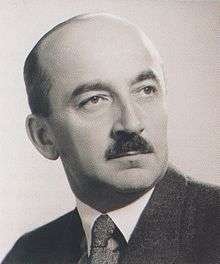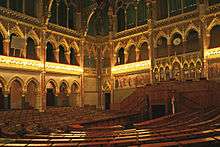Ferenc Nagy
Ferenc Nagy (Hungarian: [ˈfɛrɛnt͡s ˈnɒɟ]; 8 October 1903 – 12 June 1979) was a Hungarian politician of the Smallholders Party. He was a Speaker of the National Assembly of Hungary from 29 November 1945 to 5 February 1946 and a member of the High National Council from 7 December 1945 to 2 February 1946.
Ferenc Nagy | |
|---|---|
 | |
| 40th Prime Minister of Hungary 1st Prime Minister of the Second Hungarian Republic | |
| In office 4 February 1946 – 31 May 1947 | |
| Preceded by | Zoltán Tildy |
| Succeeded by | Lajos Dinnyés |
| Speaker of the National Assembly of Hungary | |
| In office 29 November 1945 – 5 February 1946 | |
| Preceded by | Béla Zsedényi |
| Succeeded by | Béla Varga |
| Member of the High National Council | |
| In office 7 December 1945 – 1 February 1946 | |
| Preceded by | Béla MiklósBéla ZsedényiMátyás Rákosi |
| Succeeded by | Zoltán Tildy (as President of the Republic) |
| Personal details | |
| Born | 8 October 1903 Bisse, Austria-Hungary |
| Died | 12 June 1979 (aged 75) Herndon, Virginia, US |
| Nationality | Hungarian |
| Political party | Smallholders Party |
| Children | 5 |
Nagy was reported to be of peasant origins.[1] The subsequent Hungarian Prime Minister Imre Nagy was unrelated to him.
Later he served as Prime Minister of Hungary from 4 February 1946 to 31 May 1947. He was elected in 1946, in Hungary's first democratic election. As prime minister, he resisted attempts by the Hungarian Communist Party to gain complete control of the government. He refused attempts by the Communists to become a puppet of a Soviet backed police state, but resigned under duress (they had kidnapped his son). He gave up the premiership in return for his son and 300,000 Swiss francs. Subsequently he was granted asylum in the United States.
Nagy documented his life and political career in The Struggle behind the Iron Curtain, published by MacMillan in 1948. In 1959, he was reported to have been the president of Permindex, a trade organization headquartered in Basel, Switzerland [2][3]
Royalties from his memoirs helped him buy a house with a substantial garden plot in Herndon, Virginia (then an exurb of Washington, D.C.), there to live out his days.[4]
References
- Heino Nyyssönen (2001). "Nagy, Ferenc (1903-79)". In Bernard A. Cook (ed.). Europe Since 1945: An Encyclopedia. Volume II, K – Z. New York: Garland Publishing, Inc. pp. 335–336. ISBN 9780815313366. Retrieved 27 May 2013.
- "A Market Place for All the World". The Age. Melbourne. Australian Associated Press / Reuters. 12 March 1959. p. 2. Retrieved 7 February 2013.
- Ryan, Nigel (16 April 1959). "Phantom City of Mussolini To Become Shopping Centre". The Windsor Daily Star. Windsor, Ontario. Reuters. p. 51. Retrieved 7 February 2013.
- "Nagy Purchases Farm In Fairfax County". The Washington Post. 4 September 1947.
Further reading
- Nagy, Ferenc; Stephen K Swift (1948). The struggle behind the Iron Curtain. New York: Macmillan Company. OCLC 186311583.
- Nagy, Ferenc (1963). The statesman in the free world and in communism. OCLC 24070950. Audiobook on tape : Lectures, speeches; English.
- Nagy, Ferenc (1990). Küzdelem a vasfüggöny mögött (in Hungarian). Budapest: Európa : História. ISBN 978-963-07-5171-1. OCLC 24084729.
- Vida, István (1990). Ferenc Nagy, a Hungarian agrar-democrat in the first half of the 20th Century : (sketch of his portrait). Budapest: Történettudományi Intézet. OCLC 38784552. Retrieved 27 October 2008.
- Csicsery-Rónay, István (1995). Nagy Ferenc miniszterelnök : visszamelékezések, tanulmányok, cikkek (in Hungarian). Budapest: Ezerkilencszáznegyvenöt Alapítvány : Occidental Press. ISBN 978-963-7871-05-4. OCLC 36083793. Retrieved 27 January 2008.
- Csicsery-Rónay, István (2005). A történelem szolgálatában : (tanulmányok, cikkek, beszédek) (in Hungarian). Budapest: Occidental Press. ISBN 978-963-7871-26-9. OCLC 78888454. Retrieved 27 January 2008.
External links
- A film clip "Longines Chronoscope with Ference (SIC) Nagy" is available at the Internet Archive
- Speech by Ferenc Nagy on 23 March 1968, discussing America and the future of East Central Europe. Audio recording from The University of Alabama's Emphasis Symposium on Contemporary Issues
- Newspaper clippings about Ferenc Nagy in the 20th Century Press Archives of the ZBW
| Political offices | ||
|---|---|---|
| Preceded by Béla Zsedényi Provisional National Assembly |
Speaker of the National Assembly 1945–1946 |
Succeeded by Béla Varga |
| Preceded by Zoltán Tildy |
Prime Minister of Hungary 1946–1947 |
Succeeded by Lajos Dinnyés |
| Preceded by Jenő Tombor |
Minister of Defence Acting 1946 |
Succeeded by Albert Bartha |

